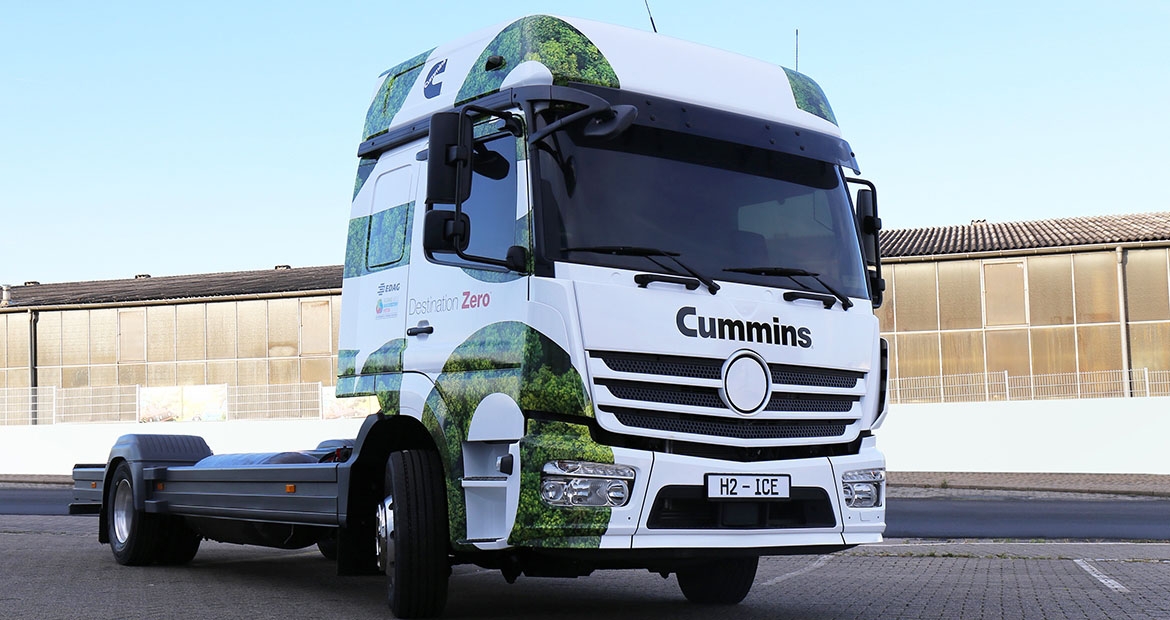Multi-million dollar award signals strong support for Cummins' hydrogen engines
By Tom Quimby, On-highway Journalist

Roughly three years ago there was not much talk about hydrogen engines according to Jim Nebergall, Executive Director – Market Strategy, Cummins Inc.
"When I started, nobody knew what this was," said Nebergall who also serves as Cummins' general manager of hydrogen engines. "We decided this is important enough for Cummins to focus on."
The Biden administration, the European Union and the United Kingdom have certainly expressed support. The California Air Resources Board (CARB) has remained tepid. Hydrogen engines have not been included in their zero-emission vehicle rules. Ultimately, Cummins continues to advocate for the technology as the sooner fleets can get to reducing emissions with proven engine technology, the better.
The Biden administration has taken notice of the impressive potential of hydrogen internal combustion engines (H2-ICE). Federal policymakers have given a thumbs up to Cummins, Paccar and Mahle (a tier two supplier for Cummins) for their work in hydrogen combustion. The three were awarded a total of $10.5 million from the Department of Energy's Vehicle Technologies Office for research and development.
Cummins Chair and CEO Jennifer Rumsey recognized the award as an important milestone.
"Hydrogen internal combustion engines (H2-ICE) are essential to achieving our Destination Zero strategy, which is our dual-path approach to reducing the greenhouse gas and air quality impacts of our products," said Rumsey. "Hydrogen ICE provide a zero-carbon solution that builds on existing engine-based platforms and are capable of meeting the new, more stringent 2027 NOx regulations, which are more than 80 percent more stringent than today's regulations. We support legislation enabling this critical clean energy technology."
H2-ICE costs much less than fuel cell and all-electric while delivering power that is on par with diesel. Fifteen minute refueling times and a 500-mile range with familiar engine architecture that does not require huge and costly shifts in shop tooling and training are all big wins.
Emissions is where H2-ICE really shines. Emissions are low enough with Cummins' line of hydrogen engines to meet the EU's definition of heavy-duty zero-emission vehicles.
Cary Chenanda, Vice President - Cummins Emissions Solutions, pointed out that the harder an engine is pushed, the greater its emissions. Carbon dioxide, a destructive greenhouse gas, is significantly reduced to near-zero during combustion in a Cummins hydrogen engine.
"By using hydrogen as a fuel, you are able to achieve the high duty cycle while getting the lowest carbon dioxide emissions," Chenanda said in a Cummins video addressing H2-ICE emissions. Small amounts of NOx will be mitigated by selective catalytic reduction (SCR), Chenanda added.
It is also worth noting that H2-ICE can become carbon negative when fueled by hydrogen produced from methane according to CARB’s latest carbon intensity fuel pathway report.
Hydrogen engines can also run on hydrogen that does not require higher levels of purity needed for fuel cells. Nebergall said this will help in the transition to zero-emission fuel cells as hydrogen infrastructure expands along with refinement capabilities.
Cummins has led the way with R&D investment on H2ICE technology in the UK after receiving substantial government funding from the Advanced Propulsion Centre to develop a hydrogen internal combustion engine for truck and construction equipment. This R&D is being led at the company's Darlington facility working alongside leading businesses such as Phinia and Johnson Matthey.
CARB does not indicate an acceptance of H2-ICE but expressed in a statement the interest in maintaining an open mind for driven stakeholders like Cummins that continue to innovate in the space.
"CARB is tracking emerging hydrogen combustion technologies including having conversations with a broad group of interested parties on the topic. We will continue to evaluate emissions and durability data as it becomes available to determine how it aligns with the state's public health and air quality goals. At this time, various engine products with hydrogen combustion technology can be certified for sale by U.S. EPA and CARB. CARB's priority remains public health and keeping California on course to counter the worst impact of climate change."
Hydrogen appeal across political aisles
According to the EPA, medium and heavy-duty trucks are attributable for 23% of total GHG emissions in the United States. Companies are working alongside competitors, research think tanks and government agencies to create new technology and enhance existing models to reduce and eliminate truck emissions.
Though each powertrain has its pros and cons, when it comes to meeting the challenging demands of medium and heavy-duty trucking, it is hydrogen that is continuing to build bridges across technological and, perhaps more importantly, political divides.
In its story “The Green Fuel That Even Red America Loves,” The Wall Street Journal notes that hydrogen has gained support from Republican representatives in Louisiana and Texas, both longtime key players in fossil fuels which are rich in hydrogen.
And of course everything is bigger in Texas, including green hydrogen which is obtained from water through electrolysis powered by renewable energy like wind, solar or hydro. Just over a year ago, Republican Gov. Greg Abbott announced that his state would become home to the nation's largest green hydrogen manufacturing plant. Following its targeted opening in 2027, Air Products and AES Corporation's new megascale plant is expected to produce 200 metric tons per day of green hydrogen.
"This project will not only bring hundreds of jobs and millions in revenue to the Lone Star State, but will also expand our state's robust energy sector and further solidify Texas as a global powerhouse in this critical industry,” Abbott said.
Texas is home to one of seven hydrogen hubs recently launched across the U.S. by the Department of Energy through its Regional Clean Hydrogen Hubs (H2Hubs) program. In the October announcement, President Biden pledged $7 billion for these hubs to build facilities to manufacture clean hydrogen.
Once they’re up and running H2Hubs are expected to produce three million metric tons of hydrogen, much of which will be used to fuel hard-to-decarbonize sectors like commercial trucks.
Cummins views H2-ICE as one of several options to help the commercial vehicle industry decarbonize. The Indiana-based company is also in the business of zero emissions through its subsidiary Accelera which manufacturers fuel cell powertrains, electrolyzers for producing hydrogen and all-electric powertrains. It's this kind of varied approach that can more quickly and effectively address emissions concerns.
Author Profiles

Tom Quimby, On-highway Journalist
Tom Quimby, On-highway Journalist, has a broad range of experience covering various topics for local and national periodicals. His stories and photos have appeared in The Washington Times and more recently in Commercial Carrier Journal, Overdrive, Hard Working Trucks, Equipment World and Total Landscape Care. Tom has reported on Class 1 - 8 commercial vehicles since 2015. A graduate of the University of Southern California, Tom enjoyed growing up around hot rods, dirt bikes, deserts and beaches near San Diego. He now calls Northwest Florida home.
Temas relacionados
Related Tags